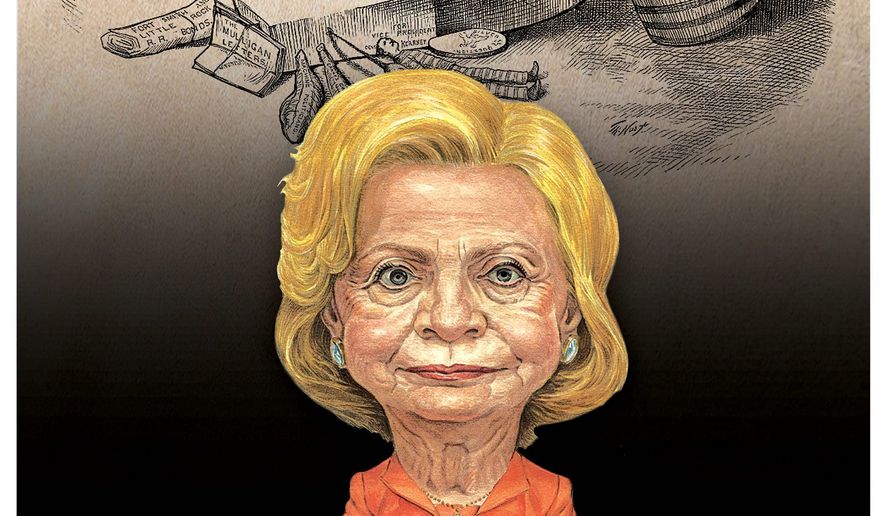OPINION:
Hillary Clinton, the presumptive Democratic nominee for president of the United States has a lingering problem that may derail her quest to become the first woman chief executive. Her once seemingly insurmountable lead in the polls has vanished as even those voters who admire her record and abilities have begun to question her forthrightness and honesty. To hear her tell it, this sort of thing is both unfair and unprecedented, but it’s happened before. Her current situation closely resembles that of another gifted politician who dealt with accusations of malfeasance and dishonesty that, in part, cost him the White House.
Mrs. Clinton and her advisers would do well to look back in history to the travails that cost James G. Blaine, considered by many in his day to have a lock on the presidency, because to put it bluntly Mrs. Clinton has a James G. Blaine problem.
Mr. Blaine, like Mrs. Clinton had one heckuva a resume. He was speaker of the House of Representatives from 1869-1875, a senator from 1876-1881, and served as secretary of state in the 1880s and 1890s. A consummate politician, Blaine was depicted by his supporters as a “Plumed Knight” who battled the corrupt stalwart leaders in his own party, who they were convinced was destined for the White House. Yet he never made it.
In politics, timing can be everything and Blaine was destined to make his run at a bad time for an insider. He came to prominence in the Gilded Age (1865-1896) when political honesty was at a premium. It was a time of government malfeasance, “An Era of Good Stealing,” according to some historians as the scandals of Ulysses Grant’s presidency defined the political landscape. This corruption left a residue of resentment among American voters and honesty in government became the sine qua non for anyone seeking office.
In 1876, Mr. Blaine appeared to have the Republican nomination locked up until charges of a sweetheart deal with the Little Rock and Fort Smith Railroad surfaced. It was alleged that he received a $64,000 loan using railroad bonds as collateral and never repaid the debt. He defended himself saying he had no direct or indirect dealings with the railroad and claimed the charges were politically motivated by his day’s equivalent of Mrs. Clinton’s “vast right wing conspiracy.” He blasted his critics as unreconstructed rebels intent upon punishing him for refusing to support a pardon for Jefferson Davis. The public seemed willing to overlook what he had apparently successfully portrayed as partisan attacks from those who would say anything to sully his reputation until the release of what became known as the “Mulligan Letters.”
James Mulligan was a Boston bookkeeper who possessed letters that purported to show Mr. Blaine had profited from the railroad deal. When they came to light, Mr. Blaine went on the attack in an attempt to discredit Mulligan by saying he had a grudge against him from an unrelated business deal.
Mr. Blaine asked to see the letters, but when he got his hands on them he wouldn’t return them, claiming they were private and personal and even refused to turn the letters over to a congressional committee investigating the charges. Mr. Blaine, like Mrs. Clinton today, launched attack after attack on the source and content of the letters in an attempt to limit any damaging fallout. He even appeared on the floor of the House of Representatives to read selected parts of the letters that he and presumably his lawyers concluded should be turned over while refusing access to the rest.
The crisis seemed to pass in the face of this strategy and the desire of others to move on. Yet, as it turned out, he could never really escape the damage to his reputation as rumors of wrongdoing, stonewalling and self-dealing persisted.
In spite of all this, Mr. Blaine ran unsuccessfully against Grover Cleveland in 1884. The old questions about his honesty quickly dogged him throughout the campaign and while other factors contributed to the outcome, the troubling doubts about his integrity played a major role in his loss.
The eerie similarities between the events that ended Mr. Blaine’s quest for the presidency and those Mrs. Clinton faces today are worth noting. The Mulligan letters and Mrs. Clinton’s email controversy have been handled in roughly the same way by the two candidates, but as the results in Iowa and New Hampshire seem to suggest, she has not escaped the sort of damage to her reputation that undermined the public’s willingness to trust Mr. Blaine more than a century ago. Unless she finds a way to reassure the voters about her probity, she, like Mr. Blaine, may find that the step from secretary of state to the White House is one she will never make.
Yogi Berra, in contemplating the similarities might have observed that “It sounds like deja vu all over again.”
• Mike Henry is a historian and teacher who lives in College Park, Md.




Please read our comment policy before commenting.